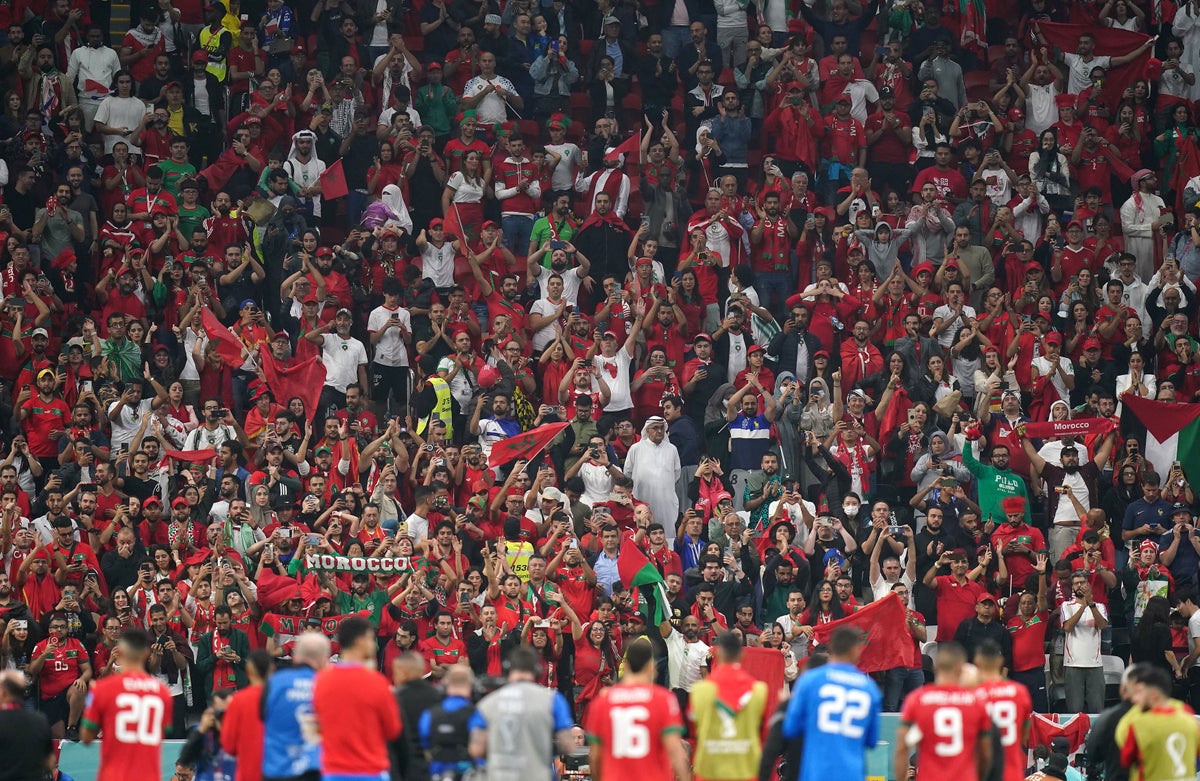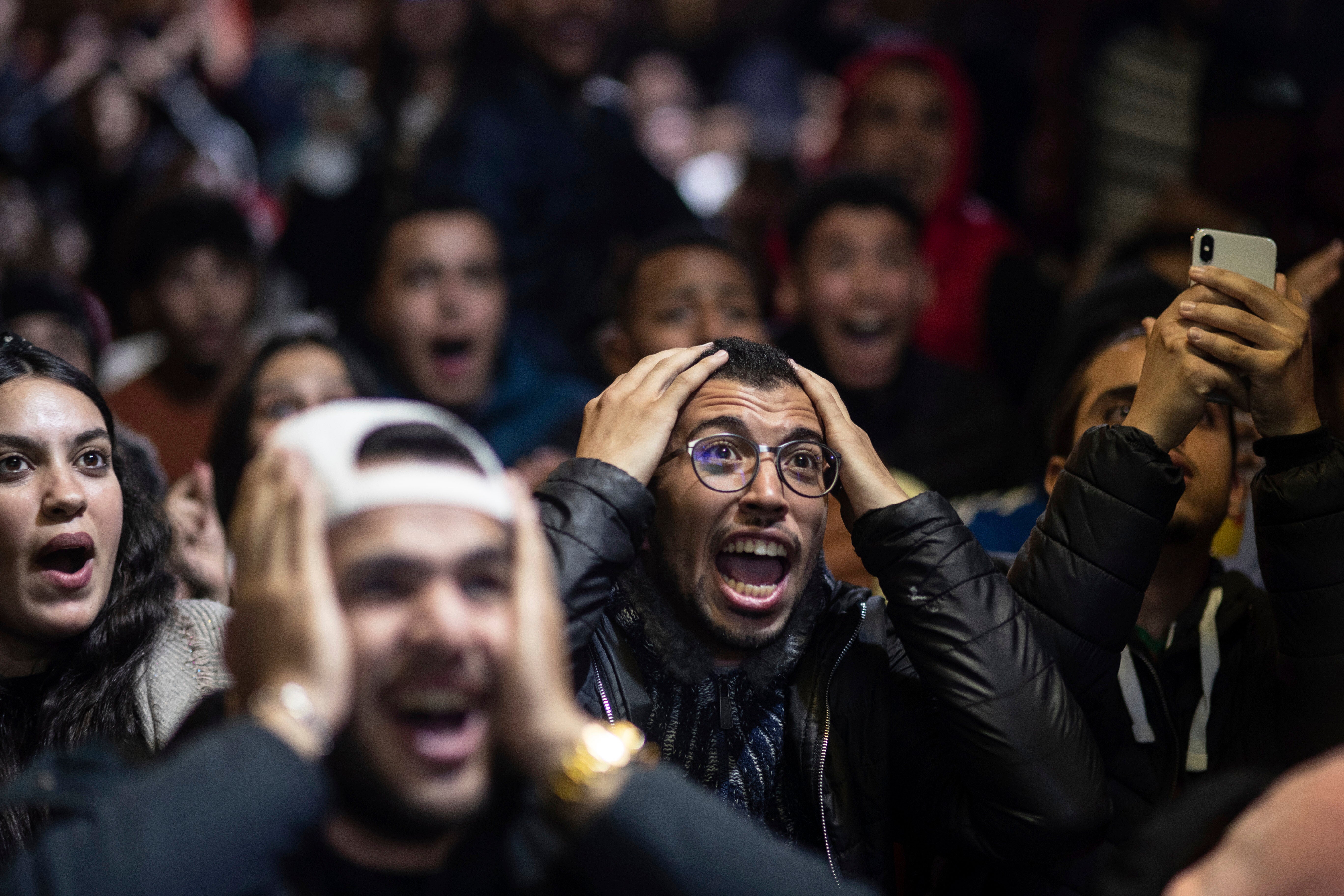
The moment it became obvious this would not be a regulation evening of association football came around 50 minutes before kick off. The stadium was barely 10 per cent full, the pitch deserted, and on jogged the French goalkeeping contingent to begin their warm-up. The reaction was deafening, a cacophony of whistles which rang out from the far end where a few thousand Moroccans had packed into the bottom tier. Then came the rest of the French players, and the whistles grew into a murderous screech. There was fury in the air, and things were about to get messy.
When they weren’t taunting the French they were drumming and singing and revelling in their first World Cup semi-final. Their chants were loud, constant and diverse, as translated at half-time by one fan with several Moroccan flags flapping around his body. “Always Morocco!” was a regular; “Boys, bring it home!” was an impassioned plea; and “Goal! Goal! Goal!” was their way of sucking the ball into the net when it came close. Later they embarked on a rousing Thunderclap and one woman pointed accusingly at people around her, demanding they stand and join in as if each and every ticket was a conscription to battle.
A night earlier Croatia had wilted under the weight of Argentina’s first goal, conceding a quick second and with it any foothold in the game. Morocco conceded much sooner here, but they did not fold. Their supporters were hushed for the briefest moment but by the time the ball was back on the centre spot they were chanting ferociously, an intoxicating swell of defiance, and if you’d not seen the goal you could have been convinced their team had scored it.
The score was 1-0 for a long time and it was really decided in the second half when France resisted wave after wave of Moroccan attack. Their fans’ presence grew and grew behind the goal they attacked, but France held firm under heaving pressure. At the other end Kylian Mbappe weaved between weary legs, Randal Kolo Muani scored, and the game was up.
In that moment it was hard to know if you were witnessing the end of something or just the start, because Morocco have made a compelling case for more. The country has unsuccessfully bid five times to host the World Cup – pipped to 1994 by USA, beaten to 1998 by France, crushed chasing 2006, edged out of 2010 by South Africa, and commercially blown out of the water by North America in 2026 – and it is going for lucky number six in 2030. And on this evidence, why not?
This is a country with a deep love for football. It is a country with a thriving club scene from Tangier to Marrakesh, with intense rivalries and more African Champions League titles than any other nation; Morocco manager Walid Regragui led their biggest club, Wydad AC, to continental glory earlier this year. It is a country with six 45,000+ capacity stadiums. And it is a country with a talented national team now known around the world, made up of diverse players proud of their roots.
Morocco’s bid is up against stiff competition, not least across the water where Spain and Portugal plan to host together. Saudi Arabia’s bid might be even more problematic, given unhinged Fifa president Gianni Infantino’s friendship with Saudi leader Mohammed bin Salman – Infantino was seen entertaining the crown prince in Qatar.

But by 2030 it will have been 20 years since the sole African World Cup, and high time for another. If the eye-watering cost of hosting sports mega-events is to have any material benefit then it is surely in a region like north Africa which could use the platform to invest in existing infrastructure and show itself, rather a place like Qatar, a glorified airport terminal in the desert which built shiny new stadiums at an extraordinary cost to the country and the planet.
What’s more, Morocco has been bidding long enough; they really do want it, and the country’s love for football has now been showcased to the world.
For a few minutes after Kolo Muani’s goal, it was as if the Moroccan fans did not know what to do, like they’d woken up in an unfamiliar room. Perhaps that is understandable; they had not conceded two goals in a game up to that point. But they soon found their voice again. At full time the Morocco players slowly pulled themselves up off the floor and walked towards their supporters, knelt and gave thanks. The noise was the loudest yet, a visceral howl, and a night which had begun with animosity ended with a show of adoration.







